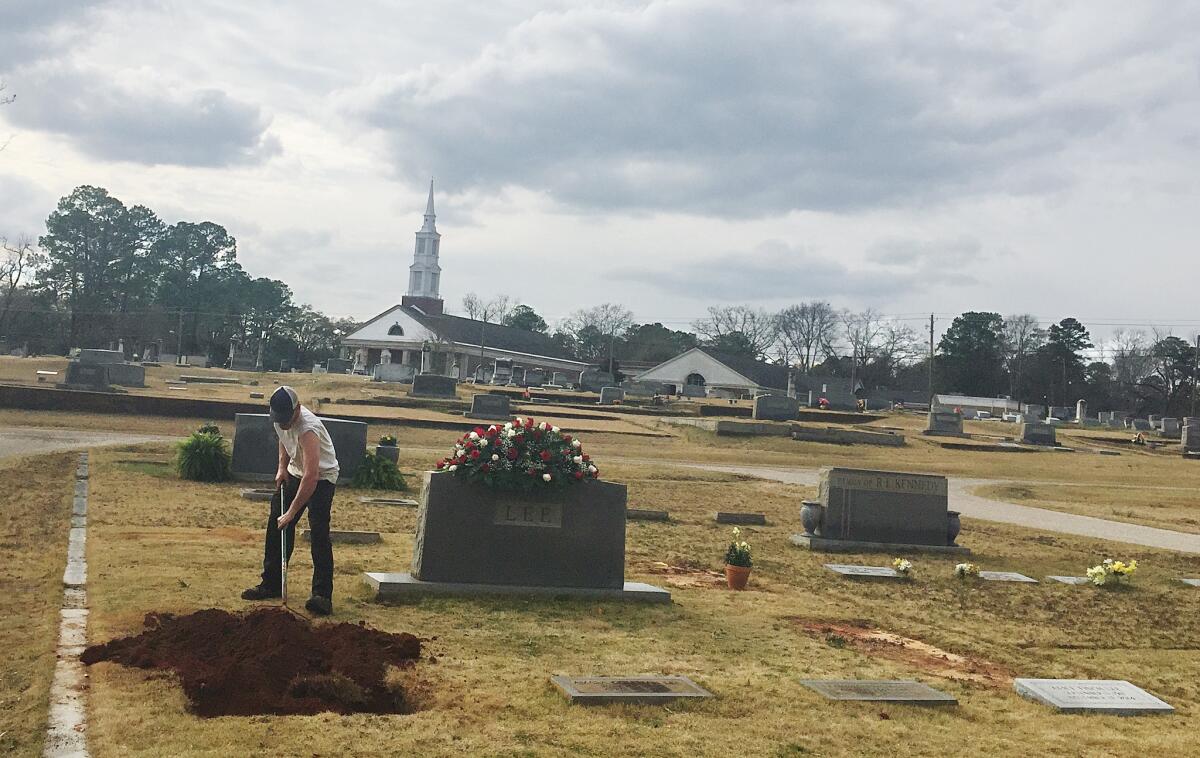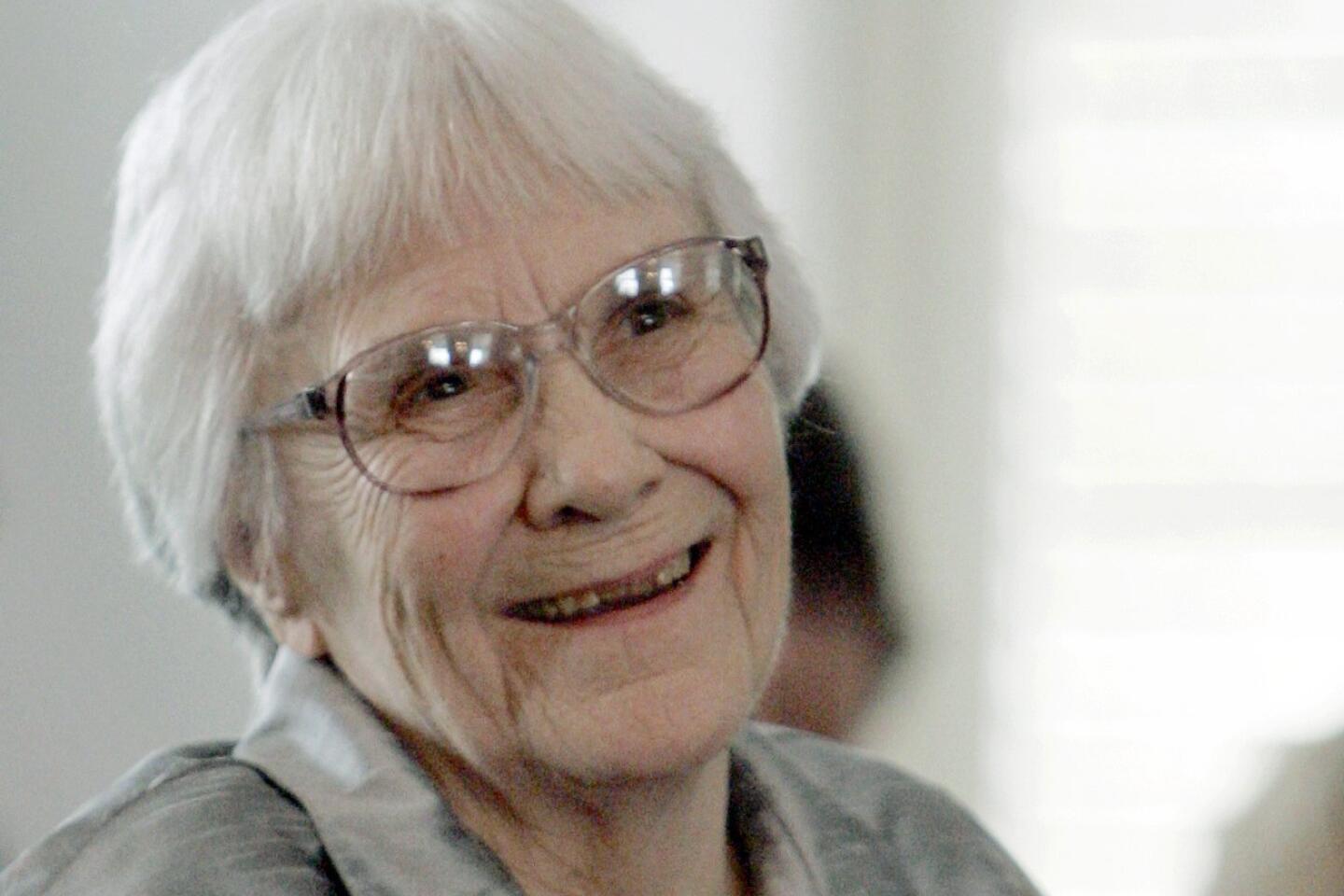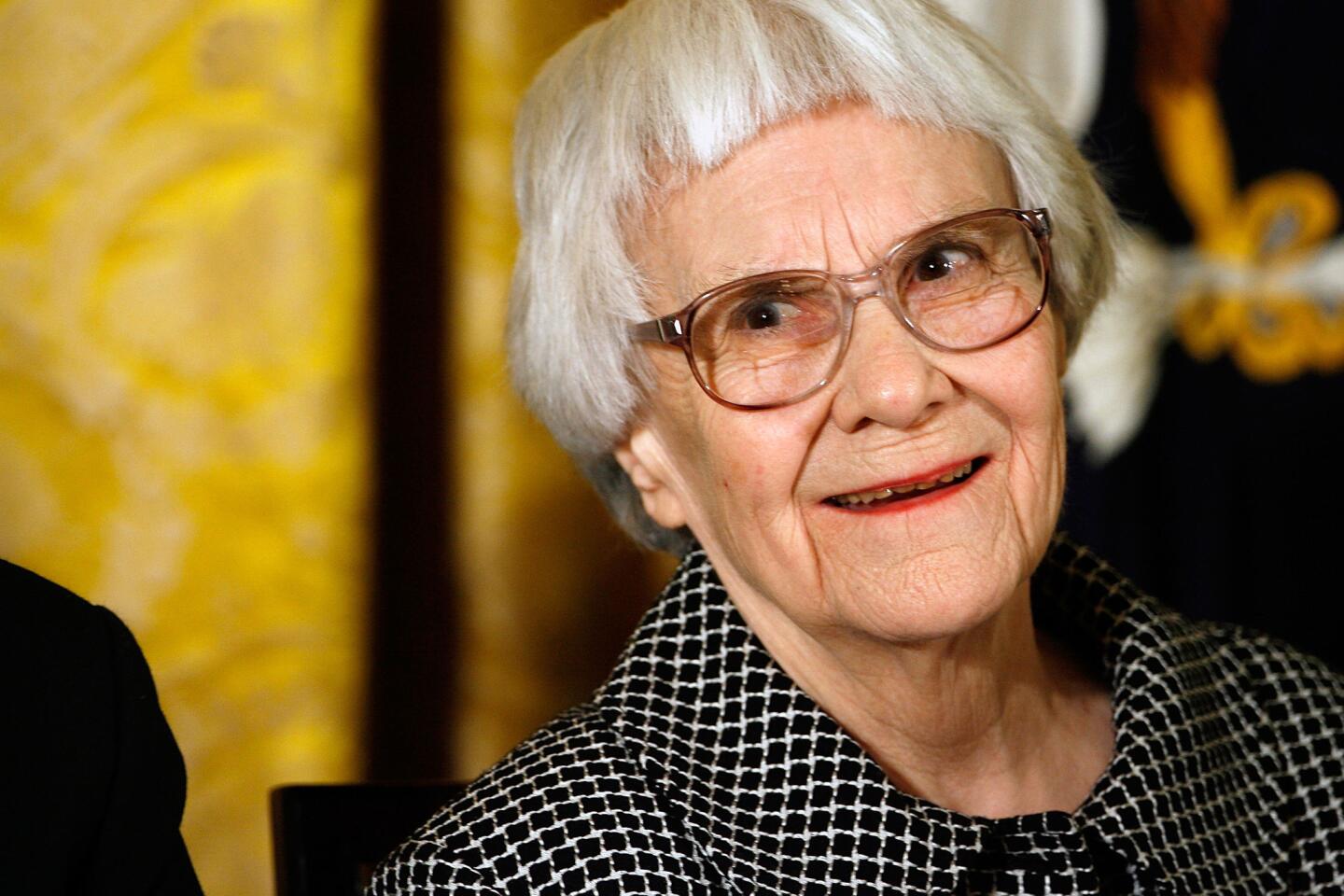Author Harper Lee quietly buried in her Alabama hometown after private funeral

A man rakes dirt over a grave in the Lee family cemetery plot Saturday in Monroeville, Ala.
Reporting from MONROEVILLE, Ala. — The author of the American classic “To Kill a Mockingbird” was laid to rest Saturday in a private ceremony attended by only the closest of friends and family, a reflection of how she had lived.
Harper Lee, who died Friday at age 89, was eulogized at a church in the small Alabama town of Monroeville, which the author used as a model for the imaginary town of Maycomb, the setting of her Pulitzer Prize-winning novel.
See the most-read stories this hour >>
A few dozen people who made up Lee’s intimate circle gathered at First United Methodist Church to hear a eulogy Saturday by her longtime friend and history professor, Wayne Flynt. Afterward, her casket was taken by a silver hearse to an adjacent cemetery where her father, A.C. Lee, and sister, Alice Lee, are buried.
Flynt, a longtime friend of Lee, said he delivered a eulogy that Lee specifically requested years ago. Entitled, “Atticus inside ourselves,” the eulogy was written by Flint for a speech that he gave in 2006 as a tribute to Lee when she won the Birmingham Pledge Foundation Award for racial justice.
Flynt said Lee liked the speech so much that she wanted him to give it as her eulogy.
“I want you to say exactly that,” Flynt quoted Lee as saying at the time. “Not one thing more, and not one thing less.”
“If I deviated one degree, I would hear this great booming voice from heaven, and it wouldn’t be God,” Flynt said in an earlier interview.
Details of the service were fiercely guarded. Lee had wanted a quick and quiet funeral without pomp or fanfare, family members said.
See more of our top stories on Facebook >>
“We obeyed her wishes,” said Jackie Stovall, Lee’s second cousin.
The town was appropriately somber a day after their native daughter’s death.
Ann Mote, owner of the Ol’ Curiosities & Book Shoppe in Monroeville, said she thought the town would always be linked to Lee.
Jared Anton, of Hollywood, Fla., sat outside the old courthouse in Monroeville during part of his planned vacation through the South that coincided with Lee’s death.
Anton said reading the book — in which attorney Atticus Finch defends a wrongly accused African-American man — was one reason he decided to become a lawyer.
“It had an impact on me when I was younger. I wanted to do the right thing, to stand up to people, to defend the innocent, if you will,” Anton said. “It is the greatest American novel. Name one that really has had more of an impact on Americans than that book.”
Mockingbirds chirped and frolicked among blooming camellia bushes outside the courthouse on the warm Alabama morning that teased the early arrival of spring.
The courthouse was where as a child Lee, like her creation Scout Finch, would peer down from the balcony as her father tried his cases in the courtroom. The Southern town was home to childhood friends Truman Capote and Lee, giving rise to its self-given nickname as the literary capital of the South.
NEWSLETTER: Get the day’s top headlines from Times Editor Davan Maharaj >>
“She’s a part of it and always will be,” said Mote.
Tributes to Lee’s novel dot the town. The courthouse is a museum that pays homage to her creation. There’s the Mockingbird Inn on the edge of town and a statue of children reading “Mockingbird” in the courthouse square.
Tickets go on sale in a week for the city’s annual “To Kill A Mockingbird” play, Mote said. A black mourning bow donned the top of the sign at the bookstore, where a stack of hard copies of “Mockingbird” sat on the counter along with a DVD of the movie.
The town this summer had a celebration for the release of “Go Set a Watchman” — Lee’s initial draft of the story that would become “Mockingbird” — even though many residents had ambivalent feelings about its release.
Lee was largely unseen in her hometown in recent years, as she first sought privacy and then was secluded at an assisted-living home. Security guards would shoo away the inevitable mix of reporters, curious onlookers and old acquaintances who were not on her list of approved visitors.
“You would see her around, but still we would honor her wishes of being a very private person. The impact from now forward, I think for the next few weeks we’ll have an influx of people in here just looking around, and at some point — like when anybody passes away — at some point it just returns back to normal,” said Tim McKenzie, chairman of the museum’s board of directors, who also acts in the play.
McKenzie said the best way fans can honor the author’s memory is by applying the values in “Mockingbird” to the way they treat others.
“That story — I’m glad it’s in just about all the schools now because it’s a story that everybody needs to hear,” he said. “If you adhere to the values she put in that book — if everybody did — we’d be living in a much better world.”
ALSO
Harper Lee dies; social media mourns but celebrates her life
Harper Lee remembered by a president, publishers and more
Harper Lee was my David Bowie: How ‘Mockingbird’ changed one writer’s life
More to Read
Sign up for Essential California
The most important California stories and recommendations in your inbox every morning.
You may occasionally receive promotional content from the Los Angeles Times.












